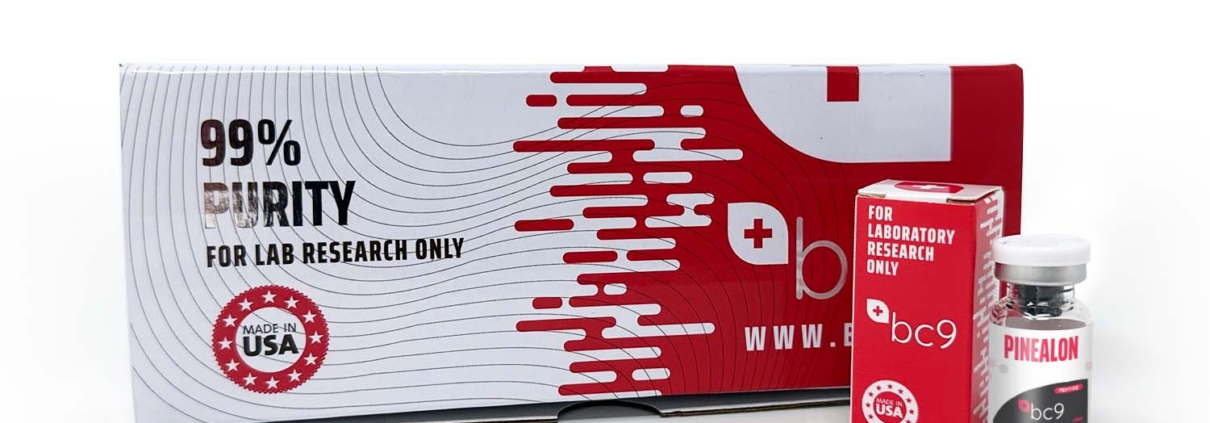The Science Behind Pinealon Peptide: A Breakthrough in Neuroprotective Research
Introduction to Pinealon Peptide
Pinealon peptide has emerged as one of the most promising bioactive compounds in neuroprotective and cognitive research. Originally derived from natural peptide bioregulators, Pinealon is a short-chain peptide composed of three amino acids glutamic acid, aspartic acid, and glycine designed to regulate cellular function and protect neural tissues from degeneration. Its unique molecular structure allows it to cross the blood-brain barrier efficiently, enhancing its effectiveness in promoting brain health, longevity, and neurogenesis.
What Is Pinealon and How It Works
Pinealon peptide acts as a neuroprotective peptide that modulates gene expression and supports protein synthesis in brain cells. Its primary mechanism revolves around regulating DNA and RNA transcription, stabilizing neuronal structures, and enhancing mitochondrial activity.
Mechanism of Action
- Gene Expression Regulation: Pinealon influences the synthesis of proteins responsible for cellular repair and longevity, optimizing brain function and delaying age-related decline.
- Mitochondrial Support: It improves ATP production, maintaining energy balance within neurons and preventing oxidative stress-induced damage.
- Anti-Apoptotic Properties: By inhibiting apoptosis (programmed cell death), Pinealon preserves neuronal integrity and slows cognitive aging.
- Epigenetic Modulation: The peptide helps in reactivating suppressed genes responsible for neuroplasticity and cognitive resilience.
Scientific Research and Clinical Findings
Recent studies have highlighted Pinealon’s ability to restore neuronal balance and mitigate oxidative stress at the cellular level. Research conducted by Russian peptide institutes and neurobiological centers demonstrated that Pinealon administration resulted in:
- Increased neuronal survival following ischemic or hypoxic conditions.
- Improved memory retention and learning abilities in aged animal models.
- Reduction in lipid peroxidation, which contributes to neurodegeneration.
- Normalization of melatonin synthesis, balancing circadian rhythms and improving sleep quality.
Pinealon’s neuroprotective effects also extend to reducing cognitive impairments associated with Alzheimer’s, Parkinson’s, and other neurodegenerative diseases by stabilizing the brain’s redox balance and improving microcirculation in neural tissues.
Pinealon Peptide and Cognitive Enhancement
One of the most striking benefits of Pinealon peptide is its nootropic potential. Unlike synthetic stimulants, Pinealon supports cognitive enhancement naturally by promoting the body’s own restorative processes.
Key Cognitive Benefits
- Improved Focus and Mental Clarity: Enhanced neurotransmitter regulation promotes sharper concentration and reduced brain fog.
- Memory Support: Pinealon assists in long-term potentiation (LTP), essential for forming and retaining memories.
- Stress Resistance: It reduces cortisol sensitivity in brain tissues, enhancing adaptability to psychological stress.
- Sleep-Wake Regulation: Pinealon harmonizes pineal gland activity, optimizing melatonin production and promoting restorative sleep.
These combined actions make Pinealon an exceptional candidate for anti-aging, longevity, and mental performance supplementation.
Anti-Aging and Longevity Applications
Pinealon has been widely recognized as a bioregulator peptide that supports systemic rejuvenation and slows the biological aging process. Its anti-aging potential lies in its ability to activate natural defense mechanisms and regulate the body’s internal clock.
- DNA Protection: Pinealon prevents telomere shortening, a key factor in cellular aging.
- Oxidative Stress Reduction: It neutralizes free radicals that damage neurons and other cells.
- Hormonal Balance: By influencing the pineal gland, Pinealon helps maintain optimal melatonin and serotonin levels, crucial for mood and circadian stability.
- Mitochondrial Longevity: The peptide enhances energy metabolism, maintaining youthful cellular performance.
Potential Therapeutic Uses
Due to its profound impact on neural health and cellular regeneration, Pinealon peptide has been studied and used in various therapeutic contexts, including:
- Neurodegenerative Disorders: Supporting recovery and slowing progression in Alzheimer’s and Parkinson’s diseases.
- Stroke Rehabilitation: Protecting neurons against ischemic injury and aiding functional recovery.
- Chronic Fatigue and Burnout: Restoring mitochondrial energy production and improving vitality.
- Age-Related Cognitive Decline: Enhancing cognitive resilience and memory function in elderly populations.
Its high biocompatibility and minimal side-effect profile make it a promising therapeutic agent for both preventive and restorative medicine.
Pinealon vs. Other Neuroprotective Peptides
While several peptides exhibit neuroprotective properties — such as Epitalon, Semax, and Cerebrolysin — Pinealon stands out due to its direct genomic modulation and pineal gland-targeted activity.
| Feature | Pinealon | Epitalon | Semax |
| Main Function | Neuroprotection, Cognitive Support | Telomerase Activation, Anti-Aging | Neurogenesis, Focus Enhancement |
| Target | Pineal Gland, Neurons | Telomeres, DNA Repair | Brain-Derived Neurotrophic Factor |
| Mechanism | Gene Regulation, Antioxidant Defense | Telomere Length Maintenance | Peptide-Induced BDNF Expression |
| Clinical Focus | Aging Brain, Memory, Neurodegeneration | Longevity, Hormonal Balance | ADHD, Post-Stroke Therapy |
This synergy suggests potential stacking benefits when Pinealon is combined with complementary peptides under professional guidance.
Optimal Dosage and Administration
Pinealon is typically administered in microgram quantities, either through subcutaneous injection or oral capsules, depending on formulation. Typical peptide cycles may range from 10 to 20 days, followed by a rest period to allow cellular adaptation.
Suggested Guidelines (for research purposes only):
- Dosage: 100–300 mcg daily
- Cycle Duration: 10–20 days
- Administration: Morning or early afternoon for optimal circadian synchronization
Note: Pinealon peptide is currently available for research use only. Clinical supervision is recommended when applied in experimental or investigational contexts.
Safety Profile and Side Effects
Studies indicate Pinealon is well-tolerated, with no significant side effects reported in controlled settings. Its natural amino acid composition ensures excellent bioavailability and minimal immune response. However, as with any peptide compound, responsible use and professional consultation are essential.
Conclusion: The Future of Neuroprotection with Pinealon Peptide
The Pinealon peptide represents a new era in neuroprotective science — merging molecular precision with natural regulation of brain function. By targeting the root mechanisms of aging, oxidative stress, and cognitive decline, Pinealon offers an unparalleled opportunity for enhancing mental clarity, longevity, and neural resilience.As ongoing research continues to uncover its full potential, Pinealon stands poised to become a cornerstone of neuroprotective therapy and peptide-based rejuvenation.


Leave a Reply
Want to join the discussion?Feel free to contribute!